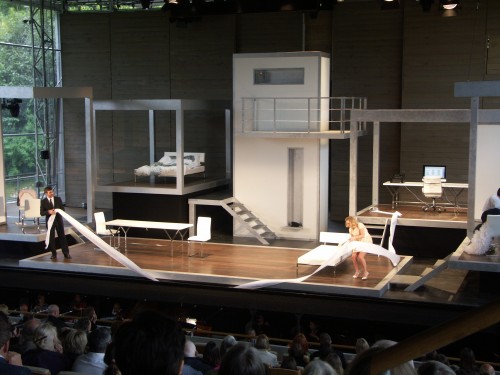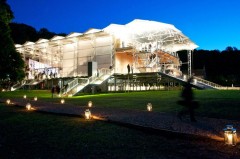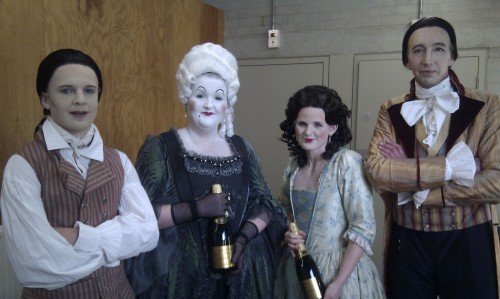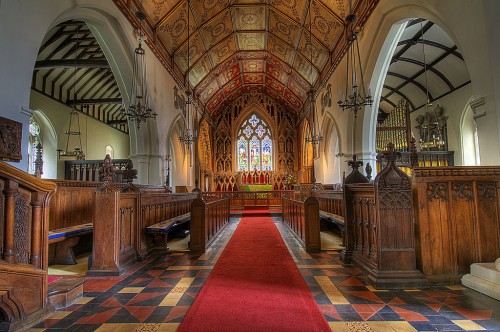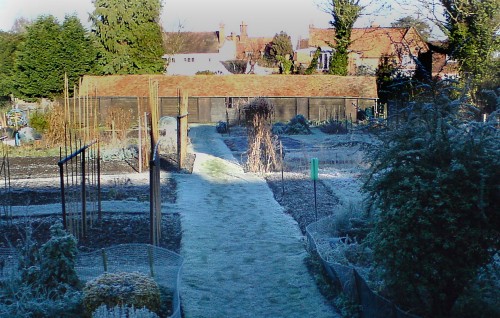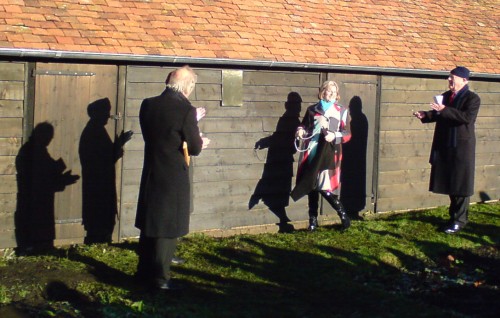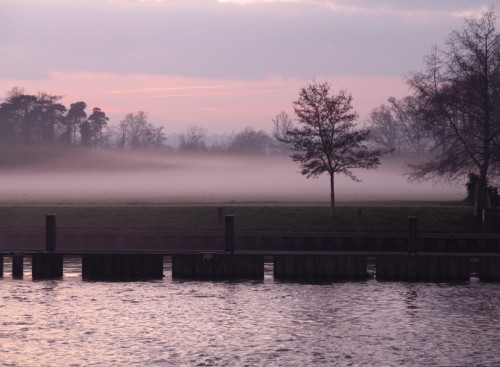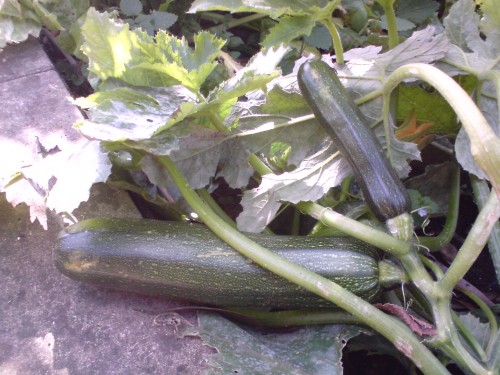It seems appropriate that in the year of the 70th anniversary of the great floods of March 1947, Oxfordshire has chosen to launch a new online ʽFlood Toolkit’ to assist those exposed to flood risk. It aims to provide a suite of solutions to help communities like Sonning Eye to better prepare for a major flood.
Local life
-
Awash with ideas…

-
Operatic times
It's been an operatic sort of month. First a highly ritzy and very gay take on Mozart's Don Giovanni at the nightclub Heaven and then the pick of the crop at Garsington Opera's pre-opening show. And sandwiched in between, my own moment under the lights, lip-syncing incompetently along to scenes from pieces including the Marriage of Figaro for a very brief video insert into be show during the Garsington production.
To begin, the Don's trip to Heaven. First performed in 1787 with the subtitle 'the rake punished' Don Giovanni is ranked the seventh most popular opera in the world, with any number of productions running concurrently, each with their own light to shed on this sleazy tale of a sexually rapcious man-about-town.
A little gender-bending did the Don no harm at all. At Heaven all his conquests were male, and the set-piece catalogue aria chronicled his victories not around Europe but in the gay cruising grounds of London of the 1980s.
The lyrics by Ranjit Bolt were scatalogically hilarious, and economical too, what with the cuts that pared the opera down from almost 3 hours to 90 minutes:
Listen Eddie, I have drawn up this list here -
And I’m not talking merely the gist here -
Not a shag he has had has been missed here –...Bankers, beggars, losers, winnners
All supply this prince of sinners
He has no time for the ladies
Takes the back door into Hades
Any size or shape of sha-ade
Indiscriminately laid!He needs a lock
Put on his cock!...People fall for this seducer
Just like fruit into a juicer
Those who call upon this lecher
Will be brought out on a stretcher
As the lead, the improbably named Australian Duncan Rock held the show together, with a powerful baritone voice shaped by his experience at ENO and Glyndebourne. His enviable physique was more than enough distraction for at least half of the grinning audience of around 400, which had to cope with poor acoustics and a slightly disorganised promenade performance. Also outstanding was Mark Dugdale as 'Zac'.
The orchestra of 10 were crisp and elegantly communicative. Even the Village People and Maggie herself put in a (distinctly dubious) appearance.
What then would all this have in common with a top flight production at Garsington Opera, in its second year at the Getty's Wormsley Park, just off the M40 near Watlington and what was your correspondent doing making a video for the show?
The trite answer is cocaine, since both shows featured enthusiastic use of the drug. With its achingly trendy set and snappy modern dress, Garsington's production is almost as far from 'straight' as was the Stephen Fry and Paul Gambaccini sponsored production at Heaven. Both feature imaginative takes on the catalogue aria, with a printer at Garsington spewing out an improbable 50' of conquests' names.
The auditorium at Wormsley is a wonderfully contemporary-looking semi-permanent structure by Snell Associates with completely clear sides and a back wall of exposed timber. It is set at the foot of the estate's home farm, close to a lake, and reached by a two and a half mile drive through private parkland.
The singing in this wonderfully upbeat and elegant show never wavered, with some magnificent performances in a room with a terrific acoustic (even if at this final rehearsal it occasionally got ahead of the energetic orchestra). Grant Doyle was a convincing and wittily engaging Don, with particularly noteworthy singing by Callum Thorpe as Masetto and Sophie Bevan as Donna Elvira.The murdered Commendatore is usually depicted as a menacing statue that returns from the dead to drag Don Giovanni down to hell. In this show he is a corpse that walks from a hospital mortuary, with the same marble white skin and ice cold touch. He also appeared from a hospital bed positioned in a niche set high in the back wall, which had a bizzarely misbehaving sliding door the night we saw the show.The final moments of the opera became a grimly menacing scene from Bedlam, with the wicked Don injected into a comatose state by some of his gloating victims, dressed as masked-up nurses. A terrific show, enthusiastically appreciated by a foot-stamping audience of 600.So just what were a bunch of amateurs doing contributing to this glittering evening? Thankfully little more than a couple of minutes of footage was shown on of us on a TV screen, as Don Givanni channel-hopped by iPad through opera videos, whilst waiting for his dinner.
The joke in the opera is that a snatch of Mozart's own Marriage of Figaro is played by the orchestra. The joke in the filming is that he catches glimpses of a series of extremely varied takes on opera production, from a creaky Dröttnignholm style full-wig 'Cosa Rara', to a completely deconstructed and very grimy 'regietheater' modern dress interpretation of the Marriage of Figaro, complete with vodka bottle, pills and porn magazine.
We got to work for a whole day with the full show's director, Daniel Slater and its designer, Leslie Travers, and they proved to be models of patience in spite of being confronted with complete amateurs. Several of my fellow cast members shone, and I lost count of the number of times I slid my hand up the thigh of my unfortunate victim, and had a gun thrust into my mouth by her jealous boyfriend. That particular moment thankfully ended up on the cutting room floor.
All three experiences proved the ability of outstanding art to withstand almost any treatment, and taken together they have made for a particularly memorable month.
-
Down by the river I
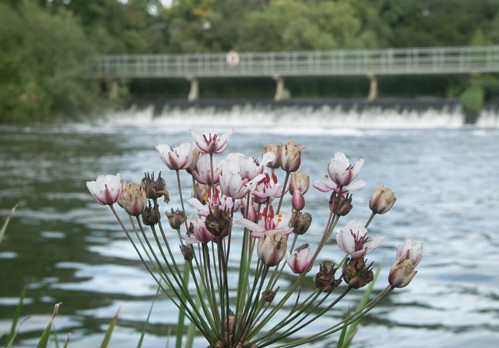 I've been swimming again at tumbling bay. Not some exotic Carribbean destination, or even a disused swimming place in Oxford, but the weir pool near here. My nieces had some canoeing practice and I swam down to where the local swimming club used to have its hut. When I was a child I used to wonder what the mysterious abandoned building was, lost in trees close to the river. Then I was given an account of an annual swimming race which used to be held from here to the next village, about 3 miles downstream.
I've been swimming again at tumbling bay. Not some exotic Carribbean destination, or even a disused swimming place in Oxford, but the weir pool near here. My nieces had some canoeing practice and I swam down to where the local swimming club used to have its hut. When I was a child I used to wonder what the mysterious abandoned building was, lost in trees close to the river. Then I was given an account of an annual swimming race which used to be held from here to the next village, about 3 miles downstream.Before foreign holidays, the river was the place for energetic recreation. In Edwardian times the village had its own annual rowing regatta, and for many years boats were for hire at Mr Light's refreshment stall.
Rivers gave life, providing water for drinking by both humans and livestock, and they also carried away the dead. A local mill-owner is still remembered for having punted his wife's body the same 3 miles from the house where she died to her burial place in the family plot in a churchyard close to the river.
The Thames was for work as well as play. Besides the corn ground at the watermill, which was listed in the Domesday book, the damp water meadows round here were perfect for growing willow osiers for the basket-making industry, which had their bark removed (stripping the willow) after soaking in the ponds which several houses still have in their gardens. More than one 18th century local listed his occupation as fisherman - presumably trapping eels in basketwork traps made from osiers taken from the same local withy beds.
As I swam in the fast-moving water I remembered a solitary swim I took years ago when a pair of kingfishers swooped low over the water down at tumbling bay - held in tight formation by the same short stick they both gripped tightly as they flew. So landscape joins our lives with the lives of others, like ours, but lived no more.
-
In the garden today
Spring will soon be here. -
Iced over
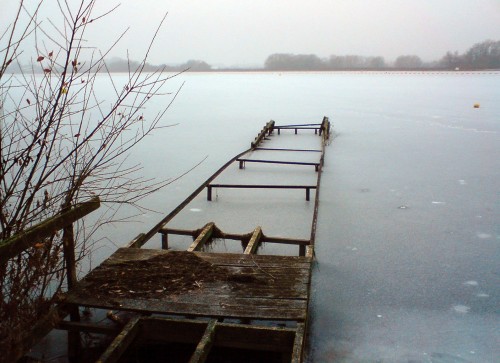 A favourite spot for outdoor swimming looked less than inviting today. Freezing temperatures didn't stop thousands of hardier souls taking to the water on Boxing Day, nor will it deter participants at the UK Cold Water Swimming Championships, at the unheated Tooting Bec Lido on 24 January.
A favourite spot for outdoor swimming looked less than inviting today. Freezing temperatures didn't stop thousands of hardier souls taking to the water on Boxing Day, nor will it deter participants at the UK Cold Water Swimming Championships, at the unheated Tooting Bec Lido on 24 January.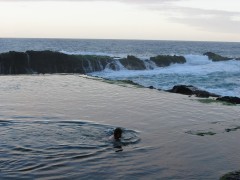 Counter-culture doesn't just mean hippies or punks. A growing community of mildly rebellious people with a healthy disrespect for 'elfensafety' swim in lakes, rivers, tidal pools and 'water-holes'. A raft of sites and forums promote wild swimming, inspired by Roger Deakin's Waterlog, which is a magnificent celebration of bathing all year round in Welsh mountain pools, Cornish holy wells, trout streams and lidos. Deakin died in 2006. There are photographs of his idiosyncratic living arrangements at the house he built at Walnut Tree Farm (including the moat that inspired him to write).
Counter-culture doesn't just mean hippies or punks. A growing community of mildly rebellious people with a healthy disrespect for 'elfensafety' swim in lakes, rivers, tidal pools and 'water-holes'. A raft of sites and forums promote wild swimming, inspired by Roger Deakin's Waterlog, which is a magnificent celebration of bathing all year round in Welsh mountain pools, Cornish holy wells, trout streams and lidos. Deakin died in 2006. There are photographs of his idiosyncratic living arrangements at the house he built at Walnut Tree Farm (including the moat that inspired him to write).Deakin had a natural gift for the most economical prose. His description of a kingfisher '"streaking by in an afterburn of blue" took me back to a swim below the weir here. As I bobbed in the water midstream, a pair of kingfishers flashed before me, tugging at either end of a twig.
'Sweet water' perfectly describes the sensation of immersion in inland waters. Even outdoor chlorinated pools will give you asthma, salt stings, but fresh water has an earthy softness like nothing else.
-
Waiting at midnight
In Yeats' 'Second Coming (Slouching towards Bethlehem)' his concern was Ireland's struggle:
Things fall apart; the centre cannot hold;
Mere anarchy is loosed upon the world,
The blood-dimmed tide is loosed, and everywhere
The ceremony of innocence is drowned
The best lack all conviction, while the worst
Are full of passionate intensity.In our village church on Christmas Eve the candles were lit, every window ledge decorated, every pew filled and there was an expectant buzz of chat just before the lights went down: the familiar, lilting solo of the first verse of 'Once in Royal David's City', then the congregation of 400 or more swelled the sound, familiar incantations that span me back to a dozen or more fortunate Christmasses before. You can find stables round here, sheltering not oxen but ponies, much-loved mounts of Cressidas or Saras. Our cattle sheds will set you back around £1m. These days they've all been converted to executive homes for the less than poor or mean or lowly.
From the priest's welcome to the final blessing, the service runs like clockwork. The same carols, in the same order, latecomers pushing in from the pub, the brisk filing up to the communion rail, busy white gowned servers administering bread and wine, then back down the north aisle, faces respectfully downcast, expressions of assumed solemnity.
The sermon quotes Betjeman, not the bible.
And is it true,
This most tremendous tale of all,
Seen in a stained-glass window's hue,
A Baby in an ox's stall ?
The Maker of the stars and sea
Become a Child on earth for me ?
And is it true ? For if it is,
No loving fingers tying strings
Around those tissued fripperies,
The sweet and silly Christmas things,
Bath salts and inexpensive scent
And hideous tie so kindly meant,
No love that in a family dwells,
No carolling in frosty air,
Nor all the steeple-shaking bells
Can with this single Truth compare -
That God was man in Palestine
And lives today in Bread and Wine.
(from Christmas by John Betjeman)In my own heart hope and doubt mingle equally.
Pope Benedict was widely reported just before Christmas as saying 'that saving humanity from homosexual or transsexual behaviour was just as important as saving the rainforest from destruction' (Irish Times). His actual words are far less simplistic, but what kind of Christmas message was this? When dogma collides so catastrophically with the secret God of the heart (the God that knows all and accepts that which is meant to be), where is the good in organised religion?
Soon after Christmas on Radio 3's 'Belief' Cambridge academic Tim Winter (Abdal Hakim) was questioned with gentle persistence by Joan Bakewell about his conversion to Islam:
I always wanted to have the person of Jesus who I was brought up with and who is an extraordinary world figure... as part of my religious vision of the world. Islam is the only non-Christian religion where He's really important, but actually comes closer to you in a strange kind of way, because in the orthodox Christian understanding, He is man but also God. And I couldn't figure out how you can actually be human if you're also God. So in a strange kind of way I felt that one of the consequences of becoming Muslim was to become much closer empathetically, humanly, to the person of Jesus than I'd ever managed as an Anglican.
His answers are revealing when he is held to account on September 11, on women and democracy in Islam. He ends with his struggle to conform:
...you go through the door, and then the reality of religion is before you, which is ultimately about loving and adoring God, loving and adoring His creation, which is endlessly brilliant, beautiful, rigorous, difficult, fascinating. And trying to represent in one's own life a conformity to how God wants His servants to be. And that's difficult. Learning how to pray is easy, but actually conforming in the depths of one's being to what the divine, benign nature wants us to be - that's the real challenge. And I'm still working on that.
The 'little town of Bethlehem' is now, like the Gaza Strip, a Palestinian territory. There's been less dreamless sleep for the Gazans since the Israeli invasion this Christmas. One religion-dominated community is yet again beating the hell out of another. What hope now for the bi-national solution imagined by humanist Edward Said?
O little town of Bethlehem
How still we see thee lie
Above thy deep and dreamless sleep
The silent stars go by
Yet in thy dark streets shineth
The everlasting Light
The hopes and fears of all the years
Are met in thee tonight
O holy Child of Bethlehem
Descend to us, we pray
Cast out our sin and enter in
Be born to us today
We hear the Christmas angels
The great glad tidings tell
O come to us, abide with us
Our Lord Emmanuel -
Shadows on the allotment shed wall
Once upon a time almost everyone could rent a patch at their local allotment garden – a haven of tranquillity where you could grow healthy food and enjoying working alongside your neighbours. In 1943 there were 1.4 million allotments in the UK but by 1993 there were just 300,000. In London today just 30,000 people have an allotment, and in some districts waiting lists are decades long.The Allotment Act is 100 years old. After being decimated by opportunistic developers and greedy councils, these little Edens are suddenly a hot topic, with a debate in Parliament this summer and a slew of active websites campaigning for them. In spite of all that few councils are likely to respond to the Act's obligation to provide an allotment garden at the request of "six registered parliamentary electors or ratepayers".
Locally at least, allotments are thriving. Today (and for the first time in her parliamentary career) Theresa May MP opened some sheds. Not your average tumbledown shack where something nasty lurks in the shadows, but listed, oak-beamed and tile-hung allotment sheds, carefully restored by a bunch of energetic volunteers in memory of a lecturer and enthusiastic allotment-holder called David Penny.
Nor were followers of Ms May's footwear disappointed, since she sported not green wellies but fetching knee-high black leather boots.
-
Wool-gathering in the autumn mists
Yesterday I did my first bit of teaching for the year: 30+ bright eyed first year students, all looking to me for enlightenment on something called 'digital design methods'. A dubious privilege – especially for them. One student told me he'd had a brief career as an undertaker's assistant, which had involved sewing up nostrils and mouths prior to embalming. Made me think of the stitching of sailor's corpses into canvas prior to burial at sea and the final stitch through the nose that made sure they were really dead.
Then I rushed back and tried to prove to some of my customers I really do know how to do it. Failed spectacularly by trying to squeeze an email the size of a bus thru a mailbox meant for Dinky toys. Just in time, I woke up to my incompetence and got the artwork through before the looming deadline.
At dinner time I was reminded that a vegetable patch is such a responsibility. Every tomato and potato grown is like my very own child - a child that just demands to be eaten. Leaving them to rot in the ground or wither on the vine is neglect of the worst kind. So I whipped up some ratatouille from a vast marrow and beefsteak toms, chopping in some fresh herbs from the garden with fresh ingredients from the village grocer, nice Mr Asda. Last week the same marrow went into a very decent leek, tomato and lentil soup (recipe tba). With a bit of luck it'll be gone by Christmas.
After a yoga class, which involved a certain amount of putting my foot in places where it doesn't belong, and a lot of blissful lying down I went to the grocer's. The fire alarm went off just after the nice assistant had found me to say they'd retrieved my two pots of yoghourt-for-£1 from the back room. The alarm had nothing to do with the lighters I bought or the quip about my being over 16. Mr Asda seems to train them well: disbelief was affected when I pointed out I was a multiple of that figure.
Last night I dreamt about my graduation as a young designer a quarter of a century ago. For our 'final displays' we were asked to exhibit our coursework. In the dream my show consisted of a couple of dozen glass jars containing exotic fragrances I had blended. How very Mrs Jeffrey Archer.
I will miss the first night of choir rehearsal tonight as I have to baby-sit my nieces who are seven, going-on-17. With luck I'll catch up on the singing next week. The choir's musical menu this year includes a bit of Tipett's 'A child of our time', some Vaughan Williams and Morten Lauridsen's 'O Magnum Mysterium' – which sounds more like an ice cream out of Philip Pullman to me.
This Saturday is (drum roll) quiz night. It's in aid of the community orchard I foolishly thought would be a good idea. In the village hall, where else. On Sunday I'd really like to go up to London for the Hadrian show or the RA and maybe the Docklands Turkish Baths but it'd be a bit of a squeeze as I am bidden to the 40th birthday celebrations of a good friend.
 It's exactly 30 years since the glorious Belgian singer Jacques Brel died. His Longchamp pipe was sold yesterday at a controversial Paris auction for €6875. The French were said to love him ten times more than British love the Beatles (which is really quite a lot). Today a newspaper article says that according to Dr David Fowler our 'beloved' Beatles weren't inspired by flower power and 'all you need is love' after all. Apparently the Beatles were young capitalists who just wanted to make a lot of money. Le plus ça change. For really revolutionary youth you apparently have to go back to the inter-war years, and a movement that was all about jumping naked into the River Cam.
It's exactly 30 years since the glorious Belgian singer Jacques Brel died. His Longchamp pipe was sold yesterday at a controversial Paris auction for €6875. The French were said to love him ten times more than British love the Beatles (which is really quite a lot). Today a newspaper article says that according to Dr David Fowler our 'beloved' Beatles weren't inspired by flower power and 'all you need is love' after all. Apparently the Beatles were young capitalists who just wanted to make a lot of money. Le plus ça change. For really revolutionary youth you apparently have to go back to the inter-war years, and a movement that was all about jumping naked into the River Cam.Enough gabble from me.
-
Never shoot into the sun...
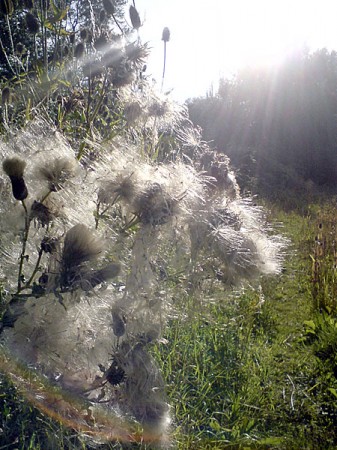 Maybe it's supposed to break the camera or something, but it seems to work for me. As well as taking these phone pictures I picked a bag of premature blackberries, but they lack sweetness and seem to be full of the heavy rain we've been having lately. What I really wanted to do was swim in the lake, which looked so tempting in the late afternoon sun.
Maybe it's supposed to break the camera or something, but it seems to work for me. As well as taking these phone pictures I picked a bag of premature blackberries, but they lack sweetness and seem to be full of the heavy rain we've been having lately. What I really wanted to do was swim in the lake, which looked so tempting in the late afternoon sun.
-
In the garden today...
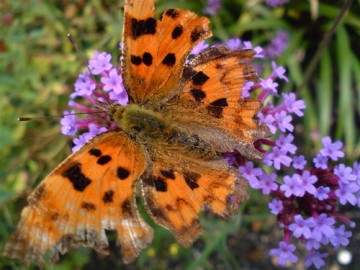
...was this lovely comma butterfly (Polygonia c-album). Unlike many other butterflies, it stayed put when I started to take pictures with my phone, so I had plenty of time to get a reasonably good shot. At first its ragged appearance made me think it was near the end of its brief life (three generations live and die each season) but now I realise the torn edges are a characteristic of the species. Perhaps it was so drunk on the verbena pollen that it did not notice me. It never stopped to fold its wings, so I didn't get to see the characteristic white punctuation mark which gives this attractive butterfly its name. -
Rub a dub dub
 An ancient family story describes a domestic science lesson (that's what they were called then). A teacher told an unenthusiastic child to 'put some elbow grease into it!' Some time later she was found searching high and low in a cupboard in a desperate attempt to find the stuff.
An ancient family story describes a domestic science lesson (that's what they were called then). A teacher told an unenthusiastic child to 'put some elbow grease into it!' Some time later she was found searching high and low in a cupboard in a desperate attempt to find the stuff.Call me a reactionary fuddy duddy if you want, but here are some juicy hand-picked factoids about effort from today's media.
In spite of all the campaigning to get kids to propel themselves to school, at many well-to-do London primary schools all pupils still arrive by car – most in gas-guzzling Chelsea tractors. The physics 'A' level now covers half the syllabus it did 10 or 20 years ago. As a result, British students no longer win the world 'Physics Olympiad'.
54% of state school teachers won't send their brightest pupils to Oxbridge because a degree at some of the best colleges in the land 'wouldn't be right for our pupils'. And only 1% of children's television shown in the UK is made here: the rest is bland cartoons and unchallenging sitcoms about 'American teenage obsessions like dating'. Age-specific educational programmes and programmes like Grange Hill that tackle British issues and values just don't get made any more.
 And then there's cleaning products... Have you noticed how they almost always promise 'no need to rub'? That'd be too much effort. Gullible media-softened saps that we are, we put our blind faith in the miracle product. Once we let the genie out of the bottle, it will solve all our problems for us. Then with a warm glow and a clear conscience we swoosh the stuff down the drain, with no thought for the environmental consequences.
And then there's cleaning products... Have you noticed how they almost always promise 'no need to rub'? That'd be too much effort. Gullible media-softened saps that we are, we put our blind faith in the miracle product. Once we let the genie out of the bottle, it will solve all our problems for us. Then with a warm glow and a clear conscience we swoosh the stuff down the drain, with no thought for the environmental consequences.Harrumph. Diaphania shuffles off to Tunbridge Wells making disgusted noises...

-
Francesco's Mediterranean Voyage
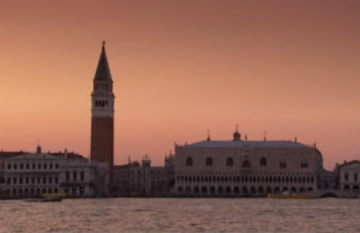
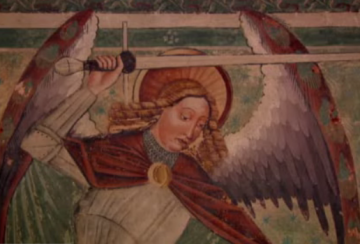
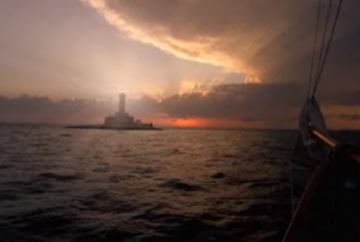
Some stunning images in BBC Two's new series presented by Francesco da Mosto in which he sails the great Venetian trading route all the way to Istanbul. In the second episode the journey begins with Pulia in Croatia - a vast Roman ampitheatre where a careless thumbs down from the crowd decided the fate of countless hapless gladiators. Da Mosto goes on to the Istrian chapel of St Mary near Bevam where 15th century frescoes depict the dance of death that comes to all, rich or poor, gladiator or not.
After visiting a solitary lighthouse keeper passionate for the sea, Francesco arrives in Split, the city built around the remains of Diocletian's vast retirement palace.
It brought back memories of my visit there and to nearby Trogir - both sparkling backdrops to some of the most aggressively opulent yachts I've ever seen. Sometimes the television camera goes to places ordinary tourists never see. We visited the Temple of Jupiter in the palace, but didn't get to the first floor living room of the man who shares his space with a fragment of the temple's pediment, complete with a recently discovered carved portrait of the building's architect.
For once the fairly constant background music (mostly by self-styled 'emotive music creator' Chris Nicolaides) didn't get in the way. It compliments the superb HD images and da Mosto's passionate and honey-tongued presentation style. Next week he covers the island of Korcula and Dubrovnik.
On the beach where I swam, da Mosto played picigin (a kind of variation on water polo) with the good-looking crew of his sailing boat. Nearby is a lido with the charged atmosphere of all those special places where swimming is taken seriously. Take me there now.

